| Reviews & Columns |
|
Reviews DVD TV on DVD Blu-ray 4K UHD International DVDs In Theaters Reviews by Studio Video Games Features Collector Series DVDs Easter Egg Database Interviews DVD Talk Radio Feature Articles Columns Anime Talk DVD Savant Horror DVDs The M.O.D. Squad Art House HD Talk Silent DVD
|
DVD Talk Forum |
|
|
| Resources |
|
DVD Price Search Customer Service #'s RCE Info Links |
|
Columns
|
|
|
Citizen Kane
"Well, Kane is a hero. And a scoundrel. A no-account, a swell guy. A great lover, a great American citizen, and a dirty dog. It depends on who's talking about him. What's the real truth about Charles Foster Kane? I wish you'd come to this theatre when Citizen Kane plays here, and decide for yourself." -- from Orson Welles's narration on Citizen Kane's theatrical trailer
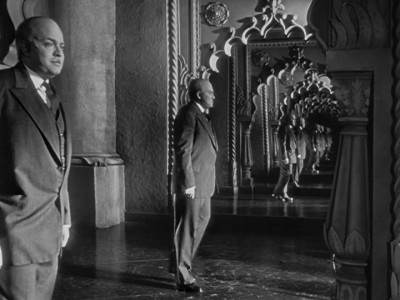
Please Note: The screen captures used here are from the 2001 DVD edition, not from the Blu-ray disc under review.
Citizen Kane, Orson Welles's 1941 masterpiece with the frequently-made and quite valid claim to being the Best Motion Picture Ever Made, is in every sense a film of such mythical proportions that its persistent evocations of Coleridge (Kubla Khan, Xanadu, etc.) seem not only unpretentious but of exactly the right scale. It has been so much remarked-upon, written about, highly ranked, studied, and praised over the years that any occasion of revisiting it can only leave one with the sense that even more self-multiplying refractions are perpetually being added on to its dizzying cinematic hall of mirrors. It is a legendary movie, by a legendary figure (Welles), about a fictional legendary figure (Charles Foster Kane), who in turn is based in large part on yet another legendary figure (newspaper tycoon William Randolph Hearst). It oh-so-seductively leads us to believe that it is pinning down a human being's "reality"--his motives, his desires, his past, his psychology--but its never-ending freshness and ability to inspire awe is based, simultaneously, on the masterful cinematic wizardry it puts at the service of involving us in its mystery, and on its ultimate, vertiginous refusal to truly solve it. The closer you get to all the different versions and images of Charles Foster Kane that the film so smartly, entertainingly, and ingeniously presents us with--and Citizen Kane can make us feel like we get very close, indeed--the further the "real" Kane recedes into inscrutable, fascinating unknowability.
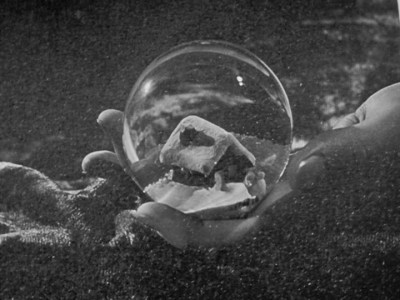
The film's arc (the rise and fall of a great, elusive person) and structure (multiple flashbacks, multiple points of view) have served as inspiration and template for so many films, but rarely with the always-renewed energy given off as we revisit the rise and fall of Charles Foster Kane (Welles), the little boy whom fate conspires, as he plays innocently with his sled in the snow, to strap onto a rollercoaster of Greatness and Wealth that he will never be able to get off of. But does he really want to? Would any of us, were we granted the one-in-a-million chance at fame, fortune, and above all power that is extended to Charles Foster Kane? Different characters have varying answers to that as they give us bits and fragments of the man's life, like so many jigsaw puzzle pieces, when our stand-in, journalist Jerry Thompson (William Alland), seeks them out after Kane's death so that he may unravel the enigma for the reading public. Through this device, we are given access to the incomplete, juicily subjective recollections of Charles Kane's boyhood caretaker, Walter Thatcher (George Coulouris), at whose closely-guarded memoirs Thompson is allowed to peek; Kane's best friends and colleagues, Mr. Bernstein (Everette Sloane) and Jedediah Leland (Joseph Cotten); his wife, Emily (Ruth Warrick); and his mistress, Susan Alexander (Dorothy Comingore). It is a wild goose chase, and we are thrilled to be included; Kane's life is eventful, to be sure, but it is the continuous suspense, the elusive (and, as it turns out, illusory) sense of layers being peeled away to reveal someone's life as only they could know it, that leads us so willingly on. There is a simply enthralling tension that builds up between our desire (facilitated by the film's magnificent, daredevil execution) to violate Kane's privacy and peer into his soul, and those nebulous entities' ultimate resistance to our advances.
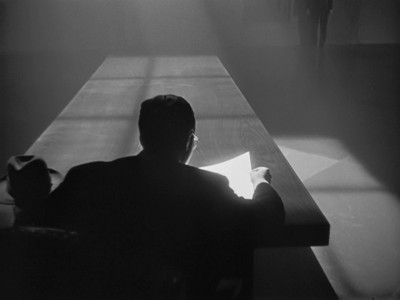
It is actually humbling to wander into this masterpiece for a subsequent viewing (or one in a series of many; Citizen Kane is exemplary of the kind of film that demands to be seen again and again), fully aware of how great it is, feeling like one remembers so vividly all of its amazing technical achievements--the unbroken takes complete with impossible lighting, evocative framing, and camera movements that are the height of fluid cinematic artistry; the artifice seamlessly blended with the real, all those matte paintings and reflections, whole environments constructed out of light and shadow--only to be taken aback once more at how incredibly ambitious and perfectly realized each moment is, and at how "naturally" all of these magical moments are fit together to create, after all the apparent back-and-forth, such an elegantly symmetrical whole. Every transition, each new sequence just afford Welles and his great cinematographer, Greg Toland, the opportunity to find the very most creative, effective way of relating what's going on. This is filmmaking as some kind of acrobatic, high-wire plate-spinning act, yet its every move is elegant, assured, taken to the furthest aesthetic limits possible without ever breaking a sweat or having even a near-miss. The film is a monument and a masterpiece, yet it has the fullest freedom of movement of any film you have ever seen, and it is too alive, too sensuous, too passionate in its storytelling to ever be consigned to the archive or the museum. If we can consider the cinema to be its own body of "literature" (and Citizen Kane is one film whose degree of intelligence, sophistication, and accomplishment firmly supports that idea), Welles's great work is to its medium what Candide is to French or Hamlet is to English; you cannot consider yourself truly cinema-literate unless you have made it, at the very least, a firm cornerstone of your frame of reference.
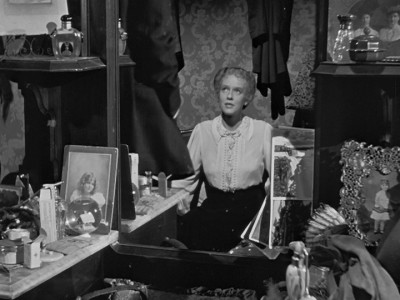
THE BD:
Citizen Kane is a film whose visual scintillation is ageless, and you have never seen it look as good as it does here, in Warner's newly restored, 1080p, AVC/MPEG-4 transfer, presenting the film in its original aspect ratio of 1.33:1. All the jaw-dropping richness and contrast of Greg Toland's brilliant black-and-white cinematography--its chiaroscuro light and shadow play, its famous deep-focus clarity, its amazingly evocative compositions and movements--is so well-preserved, with all celluloid texture and contrast intact and with all its remarkable visual properties so immediate that it's like watching a print newly struck by the cinema gods projected onto the silver screen of some heavenly movie palace.
Sound:The HD Master Audio mono soundtrack is beautifully done; without a single noticeable distortion or any other audio drawbacks or limitations, Kane's audio sounds so full, vivid, and multidimensional, you can scarcely believe that this remastering has stayed true to the film's original mono soundtrack. But Warners has here made the perfect compromise between that original mono audio and the standard high-quality Blu-ray technology; enough crisp, ultra-high-quality, extremely well-mixed sound (every subtlety and nuance of dialogue and music is tangibly present) emanates from that one center speaker to fill your home theater with the film's audio, which, like its every other aspect, is a cinematic element exploited to its fullest and then pushed even further into impressive realms of innovation.
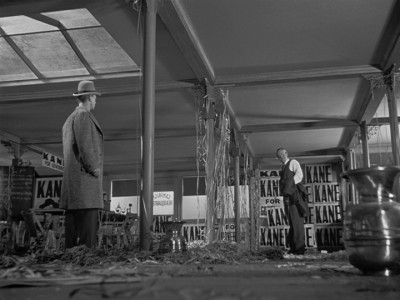
The film comes housed in a giant, beautifully designed box practically overflowing with supplements, so let's unpack it together, shall we?
--The two additional discs in the three-disc set (these are original-release DVD's, unfortunately, not Blu-ray editions) contain two entire additional feature films about Kane. Disc 2 contains Michael Epstein and Thomas Lennon's 1996 PBS doc, The Battle Over Citizen Kane, which deploys a bevy of clippings, stills, and newsreels in addition to scenes from Kane and interviews with scholars, experts, and people who were there for the making of Kane (Herman Mankiewicz's grown son, for example--and, of course, Mr. Peter Bogdanovich, among many others) as it parallels, compares, and contrasts the many almost eerie similarities (and almost as many distinctions) between Welles, Hearst, and Kane. This film, which was Oscar-nominated for Best Documentary Feature in 1996, cannot hope to "get to the bottom" of a work of art that so expertly blurs the lines between reality and artifice that there is no getting to the bottom of it; but even as it underlines the film's wonderful irreducibility, it is very illuminating on the confrontation between these two larger-than-life, oddly similar men, which almost robbed the world of cinema's most readily apparent masterpiece. Disc 3 contains Benjamin Ross's 1999 HBO film, RKO 281, in large part a dramatization of The Battle Over Citizen Kane. Liev Schreiber plays Welles, John Malkovich plays Mankiewicz, James Cromwell is Hearst, and Melanie Griffith plays Marion Davies (with some snappy turns by Fiona Shaw and Brenda Blethyn as, respectively, Hedda Hopper and Louella Parsons). It seems almost unfair to include any other narrative feature in the same package with Citizen Kane, but this actually makes a nice counterpart to the documentary; like most HBO productions, it is solidly done, with high production values and some outstanding acting. Of course, it could only seem like a trifle compared to the real centerpiece of any Citizen Kane box set, but it is a worthy inclusion--nicely done, fun to watch, and a good little film in its own right.
--The supplements on the Blu-ray itself contain two feature-length commentary tracks, one in which Peter Bogdanovich (The Last Picture Show) guides us through the film, the other featuring Roger Ebert's comments. Since it often seems that Bogdanovich cannot utter a sentence in public without mentioning "Orson"--a real-life long-time friend of his, he would have us know--he seems a fair enough choice for commentator duties, and his track is not too disrupted by all of his Orson this and Orson that. Since he is commenting on a film by Orson, his anecdotes can encompass both their friendship and a lot of actually relevant things Orson related to him about his own experiences of and feelings about the film. Bogdanovich also employs his own intimate knowledge of filmmaking structure and technique to some nicely insightful effect. Still, he is a little too defensive on "Orson"'s behalf, and though his commentary is never too grating, it does seem off and on to be too slightly sycophantically close-in to the matter at hand to give us much perspective. Ebert's track, on the other hand, is much more unexpectedly good than Bogdanovich's. There is no nostalgia or anecdote here; the famous critic has just prepared a very close reading of Citizen Kane that contains a multitude of technical, historical, and aesthetic observations that are of a frankly shocking astuteness and easygoing articulateness, coming as they do from someone you and I associate most closely with the reduction of film evaluation to a motion of the thumb. If Ebert does occasionally indulge his principal, well-known weaknesses--a tendency to over-interpretation and a grasping, sometimes bewildering projection of his own peculiar value judgments onto the film's story--he much more often allows us to profit from his extensive studies and what he believably claims are the dozens of times he has watched the film. This is decidedly the more essential of the two commentaries, and could be useful for anyone as a great example of how to closely read a film on multiple levels.
The other audiovisual extras on disc 1 are: 1) A couple of five-minute interview segments, taken from the Turner Archive Project interviews, with Ruth Warrick (Emily Kane, the first wife) and Robert Wise (the film's ultra-adroit editor and future Curse of the Cat People and The Set-Up director). 2) "The Production," a 15-minute onscreen slideshow featuring storyboards, call sheets, and production stills, with additional voice-over commentary by Roger Ebert on why he considers Kane the greatest film ever made, his interpretation of the Charles Foster Kane character, and some thoughts on Welles's all-too-often compromised post-Kane career. 3) "Post-Production", which somewhat misleadingly promises "deleted scenes." What we get are actually stills and storyboards from deleted or dropped scenes, along with a letter from the Breen Office censors disallowing one scene, a post-Inquirer victory party set at a brothel; onscreen excerpts from the film's pressbook, which has now been reprinted for inclusion in this special-edition Blu-ray release (see below); some business-related correspondence regarding test screenings, demographics, and the like; candid photos from the film's premieres; and telegrams from the film's fans, both ordinary folk and industry insiders, praising its artistic success.
Worth a special mention is the film's clever, witty theatrical trailer. Like the film, it is far ahead of its time, shot and put together as a sort of jovial making-of, with Welles introducing us, in voice-over narration only, to his cast. (The screen is just a close-up of the microphone he is supposedly speaking into; neither Welles nor Welles as Kane appears.)
The packaging extras are a bit on the souvenirish side--no Criterion-like essays and interviews here--but they are, from a design viewpoint, beautifully done (as is the sturdy, boldly designed cardboard box containing all this). There is a sort of little commemorative hardback picture-book containing some nicely reproduced stills, storyboards, a thumbnail rendering of the story of Kane's making and reception (which we get in much more depth on the other extras), and some facts and figures on the film. There is also a folio with a visually very pleasing "Rosebud" design that holds, in its left-hand pocket, about 20 miniaturized lobby cards and posters from the film's advertising; and in the right-hand slot, a gorgeous reproduction of the original souvenir program, which was printed up as part of Kane's initial promotion campaign.
FINAL THOUGHTS:For as long as the vast, multi-tiered, ever-expanding fairground of cinema exists, Citizen Kane will be the hall of mirrors resting at its highest point, casting its shadow as far as it can over everything else. And it has never been more inviting and accessible than this new release for home viewing has made it, so whether it's the first time or the 100th time you've experienced it, step on in. Each viewing of this spectacular, seminal film is its own revelation, but that revelation is not, and can never be, final; there will always be more to Citizen Kane. DVD Talk Collector Series.
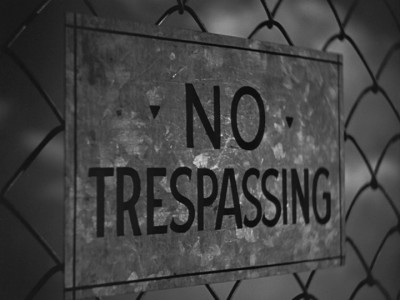
|
| Popular Reviews |
| Sponsored Links |
|
|
| Sponsored Links |
|
|
| Release List | Reviews | Shop | Newsletter | Forum | DVD Giveaways | Blu-Ray | Advertise |
|
Copyright 2024 DVDTalk.com All Rights Reserved. Legal Info, Privacy Policy, Terms of Use,
Manage Preferences,
Your Privacy Choices | |||||||













